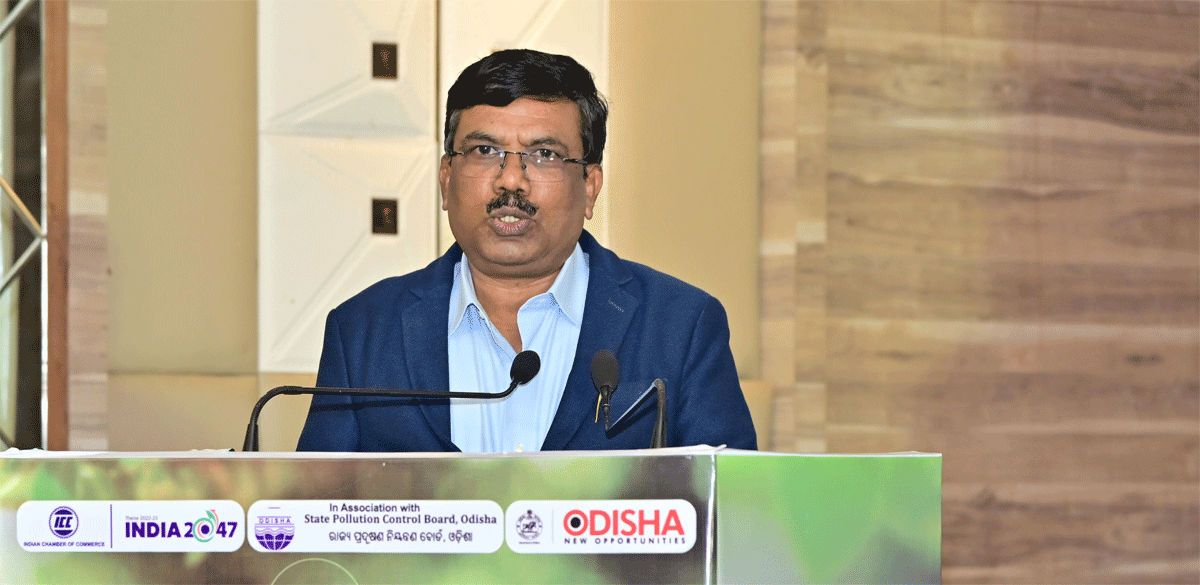Bhubaneswar: Member Secretary Odisha State Pollution Control Board, Dr.K Murugesan has urged for improving waste management practices in the State.
Dr.Murugesan was speaking at Fourth ICC Climate Change Summit here on 25 November at Hotel Mayfair.
Top Environmentalist Dr.Murugesan said that there are three critical areas in the battle against climate change: waste management, soil conservation, and land restoration.
Andharsh reality of global waste, said Dr.Murugesan. Currently, the world produces over 2.1 billion metric tons of solid waste each year, a number projected to rise to nearly 3.4 billion metric tons by 2050.
Here in India, urban areas alone generate approximately 62 million tons of waste annually, with only about 30% effectively treated or recycled. This waste, especially plastics, electronics, and hazardous materials, contaminates our soil and water, introducing persistent toxins into ecosystems and food chains.
Odisha may face critical environmental and climate challenges driven by the generation of 1049 MLD of industrial effluent, 780 MLD of municipal wastewater, 2658 TPD of municipal solid waste, 16678 kg/day of biomedical waste, 1114754 T of hazardous waste and 160 TPD of plastic waste.
Fly ash management poses a significant environmental challenge in the state, given its extensive coal-based power generation capacity of 18,939 MW. As of 2023-24, approximately 62 million tons of fly ash are generatedannually. With the commissioning of proposed power plants, this figure is anticipated to rise to nearly 100 million tons per annum. The power-grade coal utilized in the state contains an ash content of approximately 35–48%, leading to an estimated ash generation rate of 7–9 metric tons per day per megawatt (MT/day/MW). To manage this substantial quantity, ash ponds spanning approximately 4,350 acres.
These waste contribute to greenhouse gas emissions, water pollution, and soil degradation, intensifying climate vulnerabilities. Untreated wastewater, hazardous, and plastic waste pollute water bodies, disrupt ecosystems, and degrade soils, reducing fertility and increasing desertification risks. This impacts land quality, agricultural productivity, and resilience to extreme weather.
To address this, we must urgently improve waste management practices. Solutions like robust waste segregation, recycling, and composting at scale can prevent millions of tons of waste from reaching landfills. Additionally, waste-to-energy technologies offer a dual benefit—helping us reduce waste volume while generating renewable energy, converting challenges into opportunities for sustainable growth, pointed out Dr. Murugesan.
Shifting to soil conservation, healthy soils are fundamental to climate mitigation, as they store about 80% of terrestrial carbon. However, unsustainable farming, erosion, and pollution have severely degraded approximately 30% of global soil resources. This loss impacts agricultural productivity, food security, and carbon sequestration capacity. Adopting regenerative agriculture, which includes crop rotation, reduced tillage, and organic soil amendments, is crucial for restoring soil health and enhancing carbon storage, said Dr.Murugesan.
Finally, large-scale land restoration is essential. An estimated 2 billion hectares of degraded land worldwide could be restored through reforestation and improved land management, which would sequester significant amounts of carbon while creating sustainable livelihoods. Initiatives like the Great Green Wall in Africa, aiming to restore 100 million hectares by 2030, informed Dr.Murugesan.
He said that waste management, soil health, and land restoration are not only climate solutions but necessary investments, push for policies, community engagement, and innovations that promote sustainable practices.


